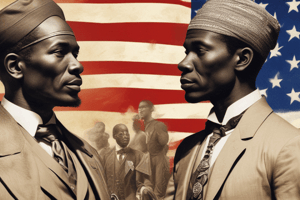Podcast
Questions and Answers
What years mark the beginning and end of Reconstruction in America?
What years mark the beginning and end of Reconstruction in America?
- 1865-1870
- 1865-1877 (correct)
- 1870-1880
- 1860-1870
Which rights were primarily held by African-Americans during Reconstruction?
Which rights were primarily held by African-Americans during Reconstruction?
- Equal rights with whites and civil service jobs
- Rights to all public facilities without restrictions
- Very limited rights under black codes (correct)
- Full political rights and land ownership
Why was Andrew Johnson chosen as Abraham Lincoln's running mate?
Why was Andrew Johnson chosen as Abraham Lincoln's running mate?
- He was a strong supporter of abolition
- He was from the South to promote unity (correct)
- He was a popular Northern politician
- He had military experience
What was a key element of Lincoln's Reconstruction Plan?
What was a key element of Lincoln's Reconstruction Plan?
Which of the following powers was established by the Reconstruction Act of 1867?
Which of the following powers was established by the Reconstruction Act of 1867?
How did Radical Republicans interact with President Johnson during Reconstruction?
How did Radical Republicans interact with President Johnson during Reconstruction?
Which hate group emerged during this period and targeted African-Americans?
Which hate group emerged during this period and targeted African-Americans?
What led to President Johnson's impeachment?
What led to President Johnson's impeachment?
What was a significant consequence of Johnson's impeachment process?
What was a significant consequence of Johnson's impeachment process?
Which Southern state was re-admitted to the Union in 1870?
Which Southern state was re-admitted to the Union in 1870?
How did sharecropping and tenant farming affect the ability of African Americans to leave their lands?
How did sharecropping and tenant farming affect the ability of African Americans to leave their lands?
What significant action did Ulysses S. Grant take against the Ku-Klux-Klan?
What significant action did Ulysses S. Grant take against the Ku-Klux-Klan?
What were the major issues faced by the Grant administration?
What were the major issues faced by the Grant administration?
How did Grant's military background influence his presidency?
How did Grant's military background influence his presidency?
What was a significant outcome of Grant's attempts to improve relations with Native Americans?
What was a significant outcome of Grant's attempts to improve relations with Native Americans?
What characterized the veto and congressional override relationship during Grant's presidency?
What characterized the veto and congressional override relationship during Grant's presidency?
What was the nature of the Whiskey Ring scandal during Grant's administration?
What was the nature of the Whiskey Ring scandal during Grant's administration?
What was one failure of the Grant Administration in terms of political support?
What was one failure of the Grant Administration in terms of political support?
Why was Grant perceived as untrustworthy during the Whiskey Ring scandal?
Why was Grant perceived as untrustworthy during the Whiskey Ring scandal?
Which of the following was NOT a tactic used to restrict African American voting rights during Reconstruction?
Which of the following was NOT a tactic used to restrict African American voting rights during Reconstruction?
What was the main purpose of the Grandfather Clause?
What was the main purpose of the Grandfather Clause?
What agreement was reached concerning the election of 1876 that effectively ended Reconstruction?
What agreement was reached concerning the election of 1876 that effectively ended Reconstruction?
Which of the following was NOT a negative consequence of Reconstruction?
Which of the following was NOT a negative consequence of Reconstruction?
What was one of the ways that sharecropping helped to keep African Americans tied to the land?
What was one of the ways that sharecropping helped to keep African Americans tied to the land?
Which of the following was a major success of Reconstruction?
Which of the following was a major success of Reconstruction?
What was the main goal of Black Codes enacted in the South?
What was the main goal of Black Codes enacted in the South?
Which of the following BEST describes the relationship between the Republican Party and African Americans during Reconstruction?
Which of the following BEST describes the relationship between the Republican Party and African Americans during Reconstruction?
What was the role of the Ku Klux Klan during Reconstruction?
What was the role of the Ku Klux Klan during Reconstruction?
What was the significance of the first impeachment attempt of a president during Reconstruction?
What was the significance of the first impeachment attempt of a president during Reconstruction?
Flashcards
Poll Taxes
Poll Taxes
A tax required to be paid before voting, disproportionately affecting African Americans.
Literacy Tests
Literacy Tests
Examinations that required voters to demonstrate reading and writing skills, often biased against blacks.
Grandfather Clause
Grandfather Clause
A law allowing individuals to vote only if their ancestors had the right to vote before a certain date, disenfranchising many blacks.
Black Codes
Black Codes
Signup and view all the flashcards
Jim Crow Laws
Jim Crow Laws
Signup and view all the flashcards
Sharecropping
Sharecropping
Signup and view all the flashcards
Tenant Farming
Tenant Farming
Signup and view all the flashcards
KKK (Ku Klux Klan)
KKK (Ku Klux Klan)
Signup and view all the flashcards
Reconstruction Successes
Reconstruction Successes
Signup and view all the flashcards
Compromise of 1877
Compromise of 1877
Signup and view all the flashcards
Reconstruction Period
Reconstruction Period
Signup and view all the flashcards
African-American Rights
African-American Rights
Signup and view all the flashcards
Andrew Johnson's Selection
Andrew Johnson's Selection
Signup and view all the flashcards
Reconstruction Plans
Reconstruction Plans
Signup and view all the flashcards
Reconstruction Act of 1867
Reconstruction Act of 1867
Signup and view all the flashcards
Radical Republicans
Radical Republicans
Signup and view all the flashcards
Southern States Re-admission
Southern States Re-admission
Signup and view all the flashcards
KKK Emergence
KKK Emergence
Signup and view all the flashcards
Johnson Impeachment
Johnson Impeachment
Signup and view all the flashcards
Tenure of Office Act
Tenure of Office Act
Signup and view all the flashcards
Vetoes and Overrides
Vetoes and Overrides
Signup and view all the flashcards
Ulysses S. Grant
Ulysses S. Grant
Signup and view all the flashcards
Grant Administration Success
Grant Administration Success
Signup and view all the flashcards
Grant Administration Failures
Grant Administration Failures
Signup and view all the flashcards
Ku Klux Klan Opposition
Ku Klux Klan Opposition
Signup and view all the flashcards
Native American Policy
Native American Policy
Signup and view all the flashcards
Whiskey Ring Scandal
Whiskey Ring Scandal
Signup and view all the flashcards
Reconstruction Challenges
Reconstruction Challenges
Signup and view all the flashcards
Study Notes
Reconstruction Era (1865-1877)
- Reconstruction marked the period after the Civil War, lasting from 1865 to 1877. It aimed to reunite the nation and rebuild the South.
- This period ended modern American history.
African-American Rights
- Rights for African Americans were extremely limited in the Reconstruction era, often defined by black codes. These codes restricted the rights of freedmen, often treating them as second-class citizens.
- Their roles in society were largely predetermined and limited, often as farm laborers or servants.
Lincoln and Johnson's Plans
- Lincoln's plan for Reconstruction focused on quickly reintegrating the Confederate states. He sought a gentle approach, emphasizing leniency toward the South.
- 10% of the people who voted in 1860 in the south had to take a loyalty oath and respect the rights of the free blacks. In the 13th, 14th, and 15th amendments had to be respected by the Southern states.
- Johnson, Lincoln's successor, held a different view. He believed the Southern states should be given significant autonomy in rebuilding themselves.
Reconstruction Acts of 1867
- Military control was established over former Confederate states and the establishment of military districts.
- Southern states had to ratify civil rights amendments.
- Black citizens' right to vote was limited.
Radical Republicans and Johnson
- Radical Republicans were a faction of the Republican Party that opposed lenient approaches to Reconstruction.
- They challenged Johnson's policies. Their relationship with Johnson was highly contentious.
- Impeachment actions were initiated by the Radical Republicans.
Southern States Rejoining the Union
- Different southern states were readmitted at various points during Reconstruction, and the specifics of readmission varied.
- The timeline varied from state to state due to different levels of cooperation with federal policies.
Southern Hate Groups
- The Ku Klux Klan (KKK) gained power in the South during this era. Their goal was to terrorize and intimidate African Americans and their supporters.
- The KKK also targeted other minority groups in the region.
Johnson Impeachment
- Johnson was impeached by the Radical Republicans. His policies, views, and actions were deemed violations of the constitution.
Grant Administration
- Key aspects of the Grant Administration included confronting the KKK, working with Native Americans, issues of corruption and the 15th amendment.
- The Grant administration also faced issues with corruption, scandals, and the implementation of political reforms.
Native American Issues
- Grant attempted to address the issues of Native Americans by treaty and reservation creation, but these efforts ultimately failed to resolve the conflict between Native Americans and the westward expansion.
Agrarian Issues
- Farmers in the West and Midwest were often opposed to the power of the railroads, as these businesses could severely impact their livelihoods and profits.
The Whiskey Ring Scandal
- In the administration of President Grant, a corrupt activity surrounding government contracts related to the liquor industry came to light. The Whiskey Ring involved a group of government officials who were defrauding the government by making illegal profits from taxes.
Successes and Failures of Reconstruction
- Successes : The 13th, 14th, and 15th amendments were a positive milestone, although implementation in society would take decades to achieve full equality and fairness.
- Failures : Despite the amendments, lasting inequalities and oppression continued in the South, leading to the continued struggle for African American equality.
Civil Rights Amendments
- Enforcement of Civil Rights was poorly supported by federal efforts after the initial ratification of the amendments.
Reconstruction Era Election of 1876
- The election of 1876 was exceptionally close, resulting in a compromise that effectively ended Reconstruction.
Dawes Act (1887)
- The Dawes Act was aimed at assimilating Native Americans into mainstream American life by dividing reservations into individual allotments.
Farmers' Grangers
- The Grangers movement sought to improve conditions for farmers through cooperative organizations. They gained more political presence.
Studying That Suits You
Use AI to generate personalized quizzes and flashcards to suit your learning preferences.




